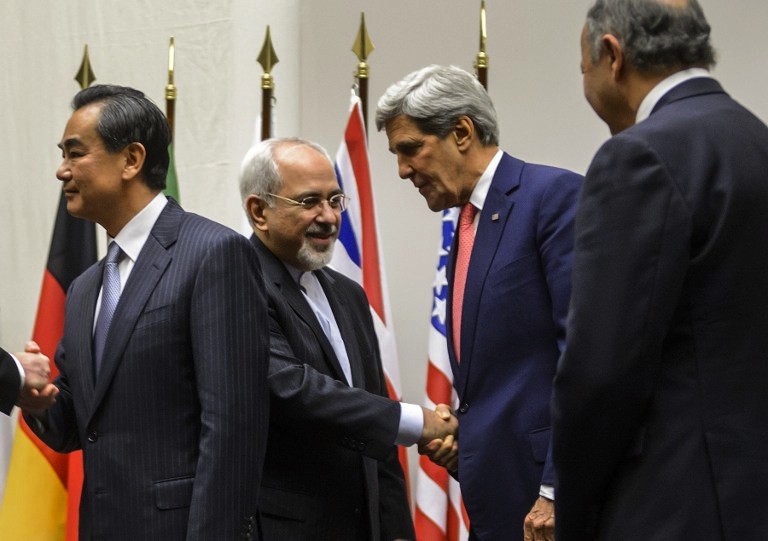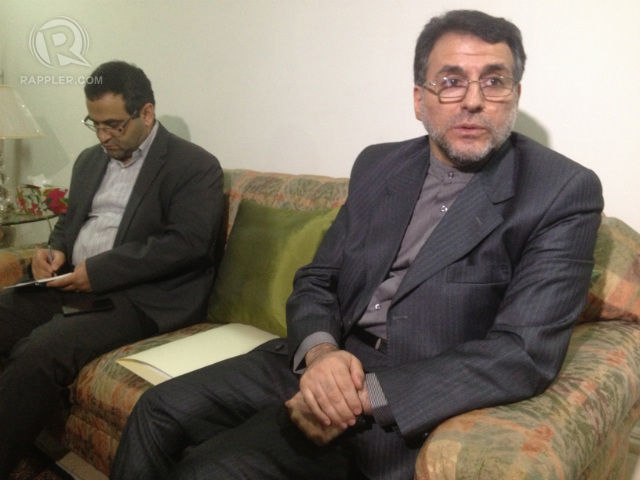SUMMARY
This is AI generated summarization, which may have errors. For context, always refer to the full article.

MANILA, Philippines – From the negotiating tables in Geneva, the effects of a historic nuclear deal with Iran can trickle down to the ordinary Filipino driver, Iran’s ambassador said Friday, November 29.
In a 6-month deal, Iran agreed to curb its nuclear program in exchange for a limited relief from sanctions. The next step: a final agreement. (READ: World powers, Iran clinch ‘historic’ nuclear deal.)
Iran wants the lifting of all sanctions through a final deal, said Iran Ambassador to the Philippines Ali Asghar Mohammadi.
These sanctions include the European Union’s ban on Iranian oil imports and the United States’ order against “significant transactions with a private or public foreign financial institution or other entity for the purchase or acquisition of Iranian oil.”
The sanctions pressured importing countries, like the Philippines, to cut their oil imports from Iran to avoid a backlash.
In a media briefing in his residence Friday, Mohammadi said a final agreement will bring “more stability and more economic development and more development in the Middle East and Persian Gulf countries.”
“If there is more prosperity in the Persian Gulf countries, it means more opportunities or jobs; Filipinos are among the best to catch those opportunities. If there is peace and development in the region, you are going to have a very fair and balanced oil price, which your ordinary people enjoy here in the Philippines – even the people, drivers of cars, of jeepneys. They should not pay a high price for this oil and energy,” Mohammadi said.
‘Directly’ hitting PH
The Middle East, after all, is a “very geopolitically important region,” the ambassador said. “Anything that happens in that particular area of the world directly hits and affects Philippine nationals.”
In the Philippines alone, the sanctions dealt Iran a huge blow.
The Philippines stopped importing crude oil from Iran in 2012, the year the US – the Philippines’ strategic partner – imposed the sanctions.
A year earlier, Iran was the Philippines’ 4th largest source of crude imports, according to the Department of Energy (DOE). The Philippines imported 8.4% of its crude oil from Iran in 2011.
At one point in previous years, the DOE said, Iran was even the Philippines’ second largest source of crude imports.
Mohammadi said the sanctions also affected the Philippines’ banana exports. He said Iran is likely the Philippines’ “biggest market in the Middle East” for bananas.
“Again, this is one of the major issues that have been affected by the sanctions,” he said. “It has affected the lives of the people here.”
‘Surge of oil’ to Asia
For analysts, the historic deal is likely to lead to a huge increase of shipments of oil from the Islamic republic to Asia.
If the interim deal struck this weekend in Geneva leads to a full lifting of sanctions, it could spark an injection of oil into an already over-supplied global market.
“With sanctions loosened, oil shipments from Iran could increase again to China, India, South Korea, and Japan,” noted Commerzbank’s analyst team.
News of the deal struck in Geneva led to oil prices falling, but the effect was limited.
If a final agreement favors Iran, its return to the market could cut $10 off price of Brent, a benchmark for crude prices worldwide.
Credit Suisse estimated that Iran has 25 to 30 million barrels of crude that it could rapidly release to the market.
Several experts reckon that if a full agreement can be reached, another one billion barrels could flow into a market that is already well-supplied.
The sanctions against the Iranian regime over its nuclear program effectively caused exports of oil from the Islamic republic to fall by more than one million barrels a day.
Exports fell from 2.5 million barrels a day in 2011 to 1.1 million in the first 9 months of this year, according to the International Energy Agency. – with reports from Agence France-Presse/Rappler.com
Add a comment
How does this make you feel?

There are no comments yet. Add your comment to start the conversation.